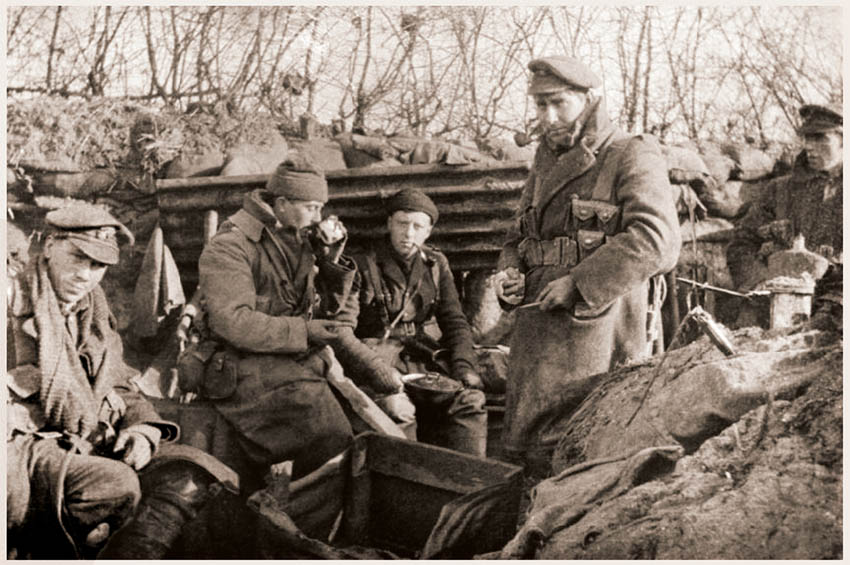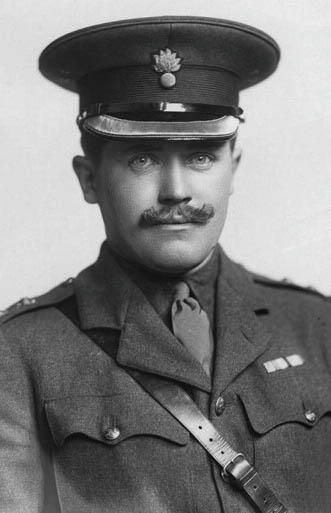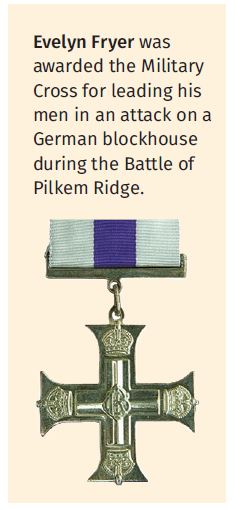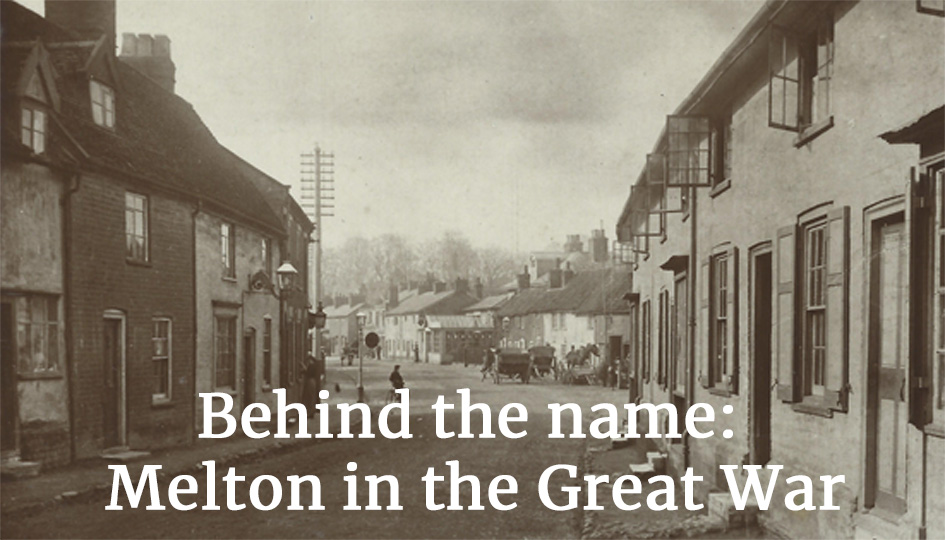Private Evelyn Friar (standing) with men of the 1st Battalion, Honourable Artillery Company in F2 trench at Lindhoek, 22nd–26th February 1915.
(IWM Q50342)
Evelyn Ronald Moncrieff Fryer, born in London on 13th November 1889, was the only son of Frederick and Mary Alice Fryer; he had two sisters, Cecily and Dorothy. In 1901, the family had a house on Warren Hill in Woodbridge and by 1911, they had taken on Bury Hill House. At that time, Evelyn was working in London as a shipping clerk.
On the 7th August 1914, three days after war was declared, Evelyn decided to join the army and spent the day going around the Territorial Regiments in London, only to be turned away due to the large number of men volunteering. He eventually arrived at the headquarters of the Honourable Artillery Company (HAC) where, with the help of a friend who was the nephew of the Colonel of the Regiment, he was able to enlist.
Training started on the 9th August and, almost immediately, the regiment was asked to provide a battalion to serve overseas. As a Territorial Regiment, however, enough men needed to agree to go. At the first time of asking, an inadequate number of men volunteered and so the following day, the Regimental Colonel, Lord Denbigh, addressed the battalion and volunteers were asked for again. On this occasion, enough men (including Evelyn) put their names forward. Their training was accelerated with the expectation of being sent to France in three or four months time but, on 18th September, they were on their way to France on board the SS Westmeath.
Evelyn and the HAC spent October both providing guards for the stores and railhead at Le Havre, or, funeral parties for men who had died of wounds. In November though, the HAC’s circumstances changed and they were sent to Ypres, then Estaires, and then to Les Lobes near the line at Neuve Chapelle. It was on Evelyn’s birthday that they came under fire for the first time when spotted by the enemy; one man was killed and ten were wounded. Evelyn remained with the HAC in the Ypres area for a while, spending most of the time they were there in the trenches at Kemmel and, towards the end of March 1915, at St Eloi.
Evelyn Friar began the Great War as a Private in the 
Honourable Artillery Company and ended as a Lieutenant
in the Grenadier Guards.
On 4th April 1915, Evelyn was posted to attend Cadet School at Bailleul and then later at Blendeques, near St Omer in France. His time training as an officer came to an end on 26th May 1915 and, after three days leave in England, he joined the 2nd Battalion Grenadier Guards as a Second Lieutenant. Evelyn was assigned to No. 3 Company with whom he remained throughout the Battle of Loos in September. On 3rd October, Evelyn was transferred to the 3rd Battalion Grenadier Guards due to the high number of officer casualties the battalion had suffered at Loos.
In September 1916, the 3rd Battalion relieved the Scots Guards in front of Lesboeufs in the Somme region of France. Evelyn was in command of a party detailed to go out on patrol, their task being to advance seven hundred and fifty yards, dig in, and wait until the next day when the rest of the battalion would join them to consolidate the new line. The patrol consisted of twelve men, a serjeant and Evelyn.
At the allotted time, they moved out along a sunken road towards Transloy, pacing out the distance to the new line. Almost as soon as Evelyn ordered his men to begin digging-in, they were shelled by their own side. Evelyn ordered a retreat of fifty yards to where they found some partially completed rifle pits and started to dig in once again. By daybreak and despite artillery fire from both sides, Evelyn’s patrol had completed enough trench to provide shelter during the day, when it was too dangerous to continue digging. Once more, artillery fire directed at their position began, and once more, it was from their own side. In the shelling, Evelyn and two of his men were slightly wounded. Upon return to the Company H.Q., Evelyn was sent to a field hospital for treatment. From there he was sent to the 34th Casualty Clearing Station (CCS) at Bray-sur-Somme and, after assessment at the CCS, he was taken to hospital in Le Touquet as it was believed there was still shrapnel in the wound.
On 6th October, Evelyn was posted to the Guards’ Division Base Depot at Le Havre for recuperation. After some leave, he rejoined his battalion on 24th November at Fricourt. His time in the trenches with them was to be short: Evelyn was sent first on a course explaining the use of the Lewis Machine Gun and then posted back to the Guards' Base Depot at Le Havre to act as an instructor for two months.
On 21st February 1917, Evelyn found No.2 Company, 3rd Grenadier Guards in the same camp as he had left them two months before, such was the stationary nature of the war at that time. Several months later, in May, Evelyn was transferred to No.1 Company as second in command. By the end of the month, they had received orders sending the battalion to Ypres. Soon after, they found themselves held in reserve for the Battle of Messines, the precursor to the beginning to the Third Battle of Ypres, or Passchendaele.
On 31st July 1917 at 03:50, Evelyn and his company were ready at their position when the Battle of Pilckem Ridge started. As ordered, they waited until 05:00, when they “popped the parapet” and crossed the Yser Canal on improvised bridges made from petrol cans. Once over the canal, they were into “no man’s land” and started to look for the landmarks they had studied behind the lines while practising for the attack: all had gone, destroyed by the artillery barrage over the preceding days.
Somehow, No.1 Company managed to identify their objectives, though not without mishap—at one point they found themselves following a group of advancing soldiers towards their next objective, only to be told they were, in fact, German soldiers retreating.
By this time, Evelyn’s company were the leading soldiers, having advanced further than those either side of them. This left the company open to attack from a set of German-held pillboxes, so, without waiting for the others to catch up, Evelyn ordered his company to deal with them. On approaching the pillboxes, the occupants surrendered to Evelyn’s company and were taken prisoner. Having successfully achieved their objectives, the 3rd Battalion Grenadier Guards dug in to consolidate their position, while the 2nd Battalion took up the advance.

Evelyn’s No.1 Company went into battle with one hundred and seventeen officers and men. They marched out forty-eight strong. It was the actions taken by Evelyn in attacking the pillboxes that earned him the Military Cross. The citation reads:
“For conspicuous gallantry and devotion to duty. During an attack, when the unit on his right was held up by a series of concrete blockhouses, he extended his company to the right, and by his vigorous actions cleared the enemy out, thus enabling the advance to be continued.”
Evelyn remained in the Ypres area until 30th October, when he was posted back to England for six month’s “home duty”. He returned to France in May 1918. In August 1918, Evelyn was put in command of No.1 Company and he remained with them until the end of the war, taking part in the Second Battle of the Somme, The Battles for the Hindenberg Line and the Battle of the Selle.
When the Armistice was called, the 3rd Battalion Grenadier Guards were posted to Cologne in Germany as part of the army of occupation. Evelyn remained there until he was sent home on 27th February 1919, arriving back in England on the 4th March.
For his war service, Evelyn received the Military Cross, 1914 Star with Rose and Clasp, and the British War and Victory Medals.
In 1921, Evelyn married Marjorie Violet Peel, daughter of a merchant banker, in London. By 1939 Evelyn was working as a Military Compensation Officer. He died in 1967.
